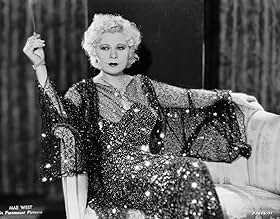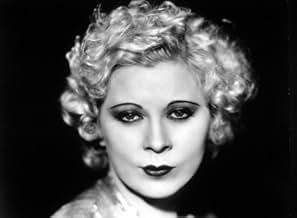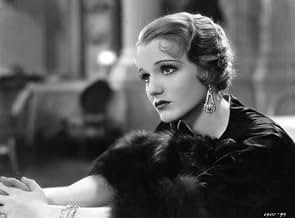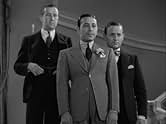NOTE IMDb
6,7/10
1,3 k
MA NOTE
Ajouter une intrigue dans votre langueA successful ex-boxer opens a high-class speakeasy in what once was the childhood home of a formerly rich society girl.A successful ex-boxer opens a high-class speakeasy in what once was the childhood home of a formerly rich society girl.A successful ex-boxer opens a high-class speakeasy in what once was the childhood home of a formerly rich society girl.
- Réalisation
- Scénario
- Casting principal
- Récompenses
- 2 victoires au total
George Templeton
- Patsy
- (as Dink Templeton)
Jay Eaton
- Nightclub Patron
- (non crédité)
Bill Elliott
- Escort
- (non crédité)
Patricia Farley
- Hatcheck Girl
- (non crédité)
Dick Gordon
- Nightclub Patron
- (non crédité)
Theresa Harris
- Ladies' Room Attendant
- (non crédité)
Avis à la une
NIGHT AFTER NIGHT (Paramount, 1932), directed by Archie Mayo, from the play "Single Night" by Louis Bromfield, is a little remembered feature known solely for its movie debut of the legendary Mae West (1892-1980). Although NIGHT AFTER NIGHT focuses mainly on its leading players, George Raft and Constance Cummings, and a little more footage to Roscoe Karns and Alison Skipworth, this average story, set almost entirely in one night at a speakeasy, about a mug owning a nightery wanting to elevate himself into the upper class of high society, actually is more interesting when Mae West dominates the scene.
NIGHT AFTER NIGHT begins with the opening titles super imposed in front of a mansion with the underscoring to "There's No Place Like Home." With the credits still rolling, a brief history about the mansion is told, first seen with a "for sale" sign, followed by a sign reading "home for rent," and finally the last look of another sign "sold at public auction," before the list of cast credits is focuses fading out with the number of the house address of "55." George Raft plays Joe Anton, a former boxer now the proprietor of a mansion converted into a New York City speakeasy (as pictured during the opening credits) who wants to become part of the social class. Because he has become interested in a mysterious but glamorous woman (Constance Cummings) who patrons his place unescorted night after night, he hires Mrs. Mabel Jellyman (Alison Skipworth), a middle- aged schoolteacher, to teach him the proper methods in speaking and the refinements of life. Eventually Joe becomes acquainted with the woman identified as Jerry Healy of Park Avenue who patronizes his place mainly because the speakeasy happens to be the mansion she had lived in years ago. Because of Anton's involvement with "Miss Park Avenue," Iris Dawn (Wynne Gibson), one of his former mistresses becomes insanely jealous, enough to want to confront Joe and Miss Healy with a loaded pistol. Joe, however, gets even more complications when another one of his old flames, Maudie Triplett (Mae West), enters the scene with her vulgarity and broad humor, rousing up his place.
The supporting cast consists of Roscoe Karns as Leo, Joe's close friend and assistant; Louis Calhern as Dick Bolton, appearing only in one scene opposite Cummings; Al Hill as Blainley; Harry Wallace as Jerky; and Tom Kennedy as Tom, the bartender, among others.
Sadly, NIGHT AFTER NIGHT is a long forgotten and often neglected little movie from the Depression era. Best known for playing gangsters, for his initial starring role, Raft's character is only associated with them, particularly gang leader, Frankie Guard (Bradley Page) who wants to buy Joe's establishment.
The story-line is slight, in fact, enough to stretch it to the 70 minute mark, with few of those minutes going to the fourth billed Mae West as Maudie. West fans would have to sit through more than a half hour devoted to other actors before making her classic entrance, first outside the speakeasy surrounded by men, followed by her walk to the coat check room where the attendant looks over her jewelry and says, "Goodness! what beautiful diamonds." West: "Goodness had nothing to do with it, dearie." With this line, and some others that were to follow, written especially by Mae West herself, a new star is born.
Essentially, this is a light drama with a touch of comedy, compliments of the wit and wisdom of Mae West, NIGHT AFTER NIGHT is one of those rare cases where two tough babes become essential in the story instead of the standard one, but it is West who's character is the most original and natural of the two. While debut films of future major stars are seldom promising, with this one being no exception, NIGHT AFTER NIGHT has become the one and only movie in which West would play a supporting role. Unlike latter West comedies, NIGHT AFTER NIGHT does not take time out for a song or two, but the use of popular tunes of the day, many introduced in other Paramount 1932 productions, including "Everyone Says I Love You," "Mimi," "Isn't It Romantic," "You Little So and So," and "Love Me Tonight" as underscoring during the nightclub sequences.
Although it was Raft who reportedly encouraged West to accept this minor supporting role, he probably never imagined that she's steal the show. In spite of NIGHT AFTER NIGHT being the film that launched George Raft career as a leading man, basically established Mae West into a box office attraction. For Raft, maybe she done him wrong.
Another unfortunate thing about NIGHT AFTER NIGHT is that because it essentially belongs to Raft and Cummings, it hardly ever became part of commercial television's Mae West festival back in the 1960s and 70s. In fact, this was and still is the least known and revived of her movies, even when given a rare cable television broadcast on Turner Classic Movies (TCM premiere: August 24, 2016). Prior to that, MCA Home Video distributed NIGHT AFTER NIGHT as part of the Mae West centennial package in 1992, releasing all her Paramount movies of the 1930s, including the neglected NIGHT AFTER NIGHT. The legend of Mae West has dimmed some over the years, but once watching any of her movies, even the one that offers little of her presence as NIGHT AFTER NIGHT, it would become apparent that she was something special. Goodness probably had nothing to do with it, but talent and her dialog delivery sure does. (***)
NIGHT AFTER NIGHT begins with the opening titles super imposed in front of a mansion with the underscoring to "There's No Place Like Home." With the credits still rolling, a brief history about the mansion is told, first seen with a "for sale" sign, followed by a sign reading "home for rent," and finally the last look of another sign "sold at public auction," before the list of cast credits is focuses fading out with the number of the house address of "55." George Raft plays Joe Anton, a former boxer now the proprietor of a mansion converted into a New York City speakeasy (as pictured during the opening credits) who wants to become part of the social class. Because he has become interested in a mysterious but glamorous woman (Constance Cummings) who patrons his place unescorted night after night, he hires Mrs. Mabel Jellyman (Alison Skipworth), a middle- aged schoolteacher, to teach him the proper methods in speaking and the refinements of life. Eventually Joe becomes acquainted with the woman identified as Jerry Healy of Park Avenue who patronizes his place mainly because the speakeasy happens to be the mansion she had lived in years ago. Because of Anton's involvement with "Miss Park Avenue," Iris Dawn (Wynne Gibson), one of his former mistresses becomes insanely jealous, enough to want to confront Joe and Miss Healy with a loaded pistol. Joe, however, gets even more complications when another one of his old flames, Maudie Triplett (Mae West), enters the scene with her vulgarity and broad humor, rousing up his place.
The supporting cast consists of Roscoe Karns as Leo, Joe's close friend and assistant; Louis Calhern as Dick Bolton, appearing only in one scene opposite Cummings; Al Hill as Blainley; Harry Wallace as Jerky; and Tom Kennedy as Tom, the bartender, among others.
Sadly, NIGHT AFTER NIGHT is a long forgotten and often neglected little movie from the Depression era. Best known for playing gangsters, for his initial starring role, Raft's character is only associated with them, particularly gang leader, Frankie Guard (Bradley Page) who wants to buy Joe's establishment.
The story-line is slight, in fact, enough to stretch it to the 70 minute mark, with few of those minutes going to the fourth billed Mae West as Maudie. West fans would have to sit through more than a half hour devoted to other actors before making her classic entrance, first outside the speakeasy surrounded by men, followed by her walk to the coat check room where the attendant looks over her jewelry and says, "Goodness! what beautiful diamonds." West: "Goodness had nothing to do with it, dearie." With this line, and some others that were to follow, written especially by Mae West herself, a new star is born.
Essentially, this is a light drama with a touch of comedy, compliments of the wit and wisdom of Mae West, NIGHT AFTER NIGHT is one of those rare cases where two tough babes become essential in the story instead of the standard one, but it is West who's character is the most original and natural of the two. While debut films of future major stars are seldom promising, with this one being no exception, NIGHT AFTER NIGHT has become the one and only movie in which West would play a supporting role. Unlike latter West comedies, NIGHT AFTER NIGHT does not take time out for a song or two, but the use of popular tunes of the day, many introduced in other Paramount 1932 productions, including "Everyone Says I Love You," "Mimi," "Isn't It Romantic," "You Little So and So," and "Love Me Tonight" as underscoring during the nightclub sequences.
Although it was Raft who reportedly encouraged West to accept this minor supporting role, he probably never imagined that she's steal the show. In spite of NIGHT AFTER NIGHT being the film that launched George Raft career as a leading man, basically established Mae West into a box office attraction. For Raft, maybe she done him wrong.
Another unfortunate thing about NIGHT AFTER NIGHT is that because it essentially belongs to Raft and Cummings, it hardly ever became part of commercial television's Mae West festival back in the 1960s and 70s. In fact, this was and still is the least known and revived of her movies, even when given a rare cable television broadcast on Turner Classic Movies (TCM premiere: August 24, 2016). Prior to that, MCA Home Video distributed NIGHT AFTER NIGHT as part of the Mae West centennial package in 1992, releasing all her Paramount movies of the 1930s, including the neglected NIGHT AFTER NIGHT. The legend of Mae West has dimmed some over the years, but once watching any of her movies, even the one that offers little of her presence as NIGHT AFTER NIGHT, it would become apparent that she was something special. Goodness probably had nothing to do with it, but talent and her dialog delivery sure does. (***)
I was expecting a lousy film whose only value was as the debut film of Mae West - I mean Leonard calls it a "crashing bore"! But what I got was a delightful film, excellently acted by all, with a profound theme and great dialogue. It is a film about dissatisfaction - all the characters are unhappy with their lot and desperately grasping for change. George Raft, the slick gangster, wants an education and true love. Constance Cummings also wants true love, although she thinks she wants security. And Alison Skipworth wants the wild life instead of school teacher drudgery. Only Mae West seems happy with her place as a man-devouring cosmetician.
This film is not a comedy - although it has many hilarious scenes (wait until you see West and Skipworth in bed together!). It is a frank and insightful drama, very risque and dangerously sexual. George Raft is unusually sensitive, Constance Cummings outstanding and Alison Skipworth dazzling. The supporting cast is also fine - led by the incomparable Mae West. A rare treat from the early 1930's.
This film is not a comedy - although it has many hilarious scenes (wait until you see West and Skipworth in bed together!). It is a frank and insightful drama, very risque and dangerously sexual. George Raft is unusually sensitive, Constance Cummings outstanding and Alison Skipworth dazzling. The supporting cast is also fine - led by the incomparable Mae West. A rare treat from the early 1930's.
Although this film is will always be remembered for introducing Mae West to cinema audiences it is actually a starring vehicle for George Raft. He had made quite an impact in 'Scarface' and here he is top billed for the first time. The studio really wanted him to be a 'Valentino' type and he certainly looks the part in this film. He's the snappiest dresser you ever did see and there's a lot of heavy makeup on his face to accentuate his smouldering good looks. He even gets to take a bath and it's quite obvious he's naked for the scene - it's all geared up to make the ladies in the audience come over all unnecessary! Unfortunately for George he suggested Mae West for a small role in the film and when she appears she hits it like a whirlwind. It's a pretty slow movie and when Mae arrives she knocks it for six with her quick-fire delivery and outrageous behaviour. She may be fat and nearly forty but she is a wow and for those people who suggest she may have been a man in drag just take a look at her in her negligee and you'll see it's quite clear she's all woman!There's not much in the way of a plot, the art direction is nothing to write home about and there's nothing innovative in the way of camera work but it's worth watching to see these two sexy, classic stars make their mark in Hollywood history. If you want to see how they ended up then you should watch 'Sextette' made forty six years later but I don't think I'd recommend it! Enjoy them in their prime!
It is not fantastic but amazingly wonderful of some of the great stars of the 30s I hardly know. But it is an early part for George Raft in his first big film, he seems a bit strange but I suppose it was the time but he made 8 films that year including Scarface. Constance Cummings only 22 at the time and also made 8 films that year this one of her first films and she is lovely. We have to wait for about half an hour before Mae West arrives, her very first film and every thing gets going when she is there. It was clear that she was going places as she sparkled so much more even though there are so many others running around. Amusing and fun to see all the others but really it is Mae West.
"Night After Night" was an otherwise unmemorable George Raft opus of the early 1930's... The scene was the entrance to a nightspot...
Enter Mae West, magnificently dripping in so much jewelery it must have given the lighting cameraman several heart attacks in his attempts to "damp it down" so that it didn't "flash up the bottle" as she moved
Cries the hat-check girl: "Goodness, what beautiful diamonds!"
Mae West: "Goodness had nothing to do with it, dearie."
Gangsters' molls... they are part of the legend of the mobster movie And in "Night After Night" it was never openly established just what kind of a dame Mae West was playing, but with all those rocks she looked like the gangster's moll to top them all
Enter Mae West, magnificently dripping in so much jewelery it must have given the lighting cameraman several heart attacks in his attempts to "damp it down" so that it didn't "flash up the bottle" as she moved
Cries the hat-check girl: "Goodness, what beautiful diamonds!"
Mae West: "Goodness had nothing to do with it, dearie."
Gangsters' molls... they are part of the legend of the mobster movie And in "Night After Night" it was never openly established just what kind of a dame Mae West was playing, but with all those rocks she looked like the gangster's moll to top them all
Le saviez-vous
- GaffesA shadow of the boom microphone is visible to the upper left of the front door of the speakeasy when Maudie first arrives.
- Citations
Hatcheck girl: Goodness, what beautiful diamonds!
Maudie: Goodness had nothing to do with it, dearie.
- ConnexionsFeatured in L'univers du rire (1982)
- Bandes originalesEveryone Says I Love You
(uncredited)
Music by Bert Kalmar
Played at the speakeasy when Joe makes the rounds and first spots Jerry
Also played at the end
Meilleurs choix
Connectez-vous pour évaluer et suivre la liste de favoris afin de recevoir des recommandations personnalisées
- How long is Night After Night?Alimenté par Alexa
Détails
- Date de sortie
- Pays d’origine
- Langue
- Aussi connu sous le nom de
- Night After Night
- Lieux de tournage
- Société de production
- Voir plus de crédits d'entreprise sur IMDbPro
- Durée1 heure 13 minutes
- Couleur
- Rapport de forme
- 1.37 : 1
Contribuer à cette page
Suggérer une modification ou ajouter du contenu manquant




































